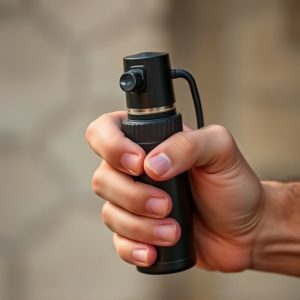Mastering Pepper Spray Defense: Care, Neutralization, Law, and Prevention
TL;DR:Immediate care after pepper spray exposure is crucial to mitigate effects. Steps include evacu…….
TL;DR:
Immediate care after pepper spray exposure is crucial to mitigate effects. Steps include evacuating the area, moving to a well-ventilated space, flushing exposed areas with water for 15+ minutes, removing contaminated clothing, and seeking medical attention if symptoms persist. Understanding local laws regarding pepper spray possession and usage is essential for responsible self-defense. Proactive vigilance in high-risk areas can help prevent exposure and immediate care protocols should always be followed post-exposure.
“Maximize your safety with a comprehensive guide to pepper spray defense. Learn about immediate care for pepper spray exposure, understanding its effects, and effective de-escalation techniques. Discover legal considerations and self-defense rights, crucial knowledge in today’s world. This article provides practical steps to neutralize pepper spray, prevention strategies, and expert tips for navigating risky situations. Stay prepared and informed with these essential practices for immediate care and beyond.”
- Understanding Immediate Care for Pepper Spray Exposure
- Assessing the Effects of Pepper Spray
- Effective Steps to Neutralize Pepper Spray
- Legal Considerations and Self-Defense Rights
- Prevention Strategies to Avoid Pepper Spray Attacks
Understanding Immediate Care for Pepper Spray Exposure
Understanding immediate care for pepper spray exposure is crucial when facing an attack. The first step is to remove yourself from the immediate area as quickly as possible, ensuring you are in a space with fresh air. This is essential to prevent further irritation and inhalation of the irritant.
Once safe, it’s important to immediately flush any exposed areas with plenty of water for at least 15 minutes. This includes washing your face, eyes, and skin. Removing contaminated clothing and thoroughly rinsing shoes and any other affected items can also help reduce contact with the spray. Seeking medical attention is advised if symptoms persist or worsen, as immediate care can alleviate discomfort and potential long-term effects of pepper spray exposure.
Assessing the Effects of Pepper Spray
When assessing the effects of pepper spray, understanding its immediate impact is crucial. After exposure, victims often experience intense irritation and pain in the eyes, nose, and throat. This can lead to temporary blindness, coughing fits, difficulty breathing, and general disorientation. The intensity of these symptoms varies based on the concentration of capsaicin, the active ingredient, and the duration of exposure.
Immediate care for pepper spray involves seeking fresh air as soon as possible. Removing contaminated clothing and washing eyes and face with clean water can help alleviate discomfort. It’s important to monitor victims for signs of respiratory distress or prolonged irritation, as these may require medical attention. Understanding these initial responses is key to providing effective support and ensuring the safety of individuals exposed to pepper spray.
Effective Steps to Neutralize Pepper Spray
In the event of exposure to pepper spray, immediate care is crucial to mitigate its effects. The first step is to move to a safe location away from the source of the spray. This can be done by quickly finding cover behind solid objects or structures that can block the spray’s path. Once in a secure area, it’s important to remove any contaminated clothing or accessories, like glasses or contact lenses, as they can trap the irritants.
Rinsing eyes and face with plenty of clean water for at least 15 minutes is an essential next step in the immediate care process. This helps to flush out the pepper spray chemicals. If possible, use eye wash stations or a garden hose for a thorough rinse. After rinsing, seek fresh air and consider using a damp cloth to soothe any lingering irritation on the skin. It’s vital to remember that proper and swift action can significantly reduce the discomfort associated with pepper spray exposure.
Legal Considerations and Self-Defense Rights
When using pepper spray for self-defense, understanding legal considerations is paramount. Each jurisdiction has specific laws governing the possession and use of such devices, so it’s crucial to familiarize yourself with local regulations. Failure to comply can lead to serious legal repercussions, including fines or even arrest.
Self-defense rights vary widely, but most jurisdictions recognize the right to protect oneself from imminent harm. Pepper spray can be a powerful tool in deterring and neutralizing an attacker, providing immediate care and time for escape. However, it must be used responsibly and within the bounds of the law, ensuring that any use is justified and proportionate to the perceived threat.
Prevention Strategies to Avoid Pepper Spray Attacks
To prevent a pepper spray attack, it’s crucial to understand how and when it’s used. Pepper spray is typically employed as a non-lethal self-defense tool, releasing a chemical irritant that causes temporary blindness, coughing, and difficulty breathing. Knowing this, individuals can take proactive steps to avoid becoming targets. One effective strategy is to remain aware of your surroundings; keep an eye out for suspicious behavior or potential threats, especially in poorly lit areas or places known for elevated crime rates.
Immediate care after exposure to pepper spray is essential. If you find yourself targeted, try to get to a safe distance as quickly as possible. Remove any contaminated clothing and wash your face, eyes, and skin with plenty of water for at least 15 minutes. This will help dilute the effects of the spray. Seek medical attention if symptoms persist or if you experience difficulty breathing, as these could be signs of more severe irritation or an allergic reaction.
Understanding immediate care for pepper spray exposure, assessing its effects, knowing effective neutralization steps, being aware of legal considerations, and implementing prevention strategies are key components in defending against and managing pepper spray attacks. By arming yourself with this knowledge, you can better protect yourself and assert your self-defense rights while adhering to legal boundaries.


